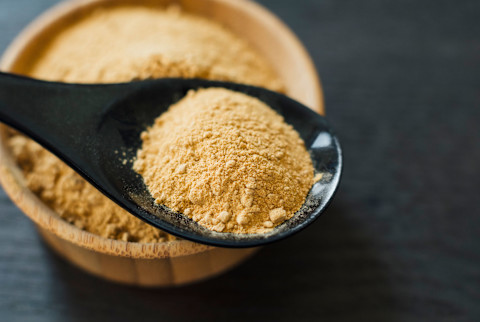Lucuma Powder Is A Notable Superfood With Many Health Benefits & Uses

The Andes might be known for awe-inspiring nature and world-renowned cuisines, but what about their impressive variety of health-fueling fruits? Many of these exotic fruits—especially from Peru, Ecuador, Bolivia, and Chile—are gaining more attention and demand within the mainstream wellness landscape, and for a good reason!
They're packed full of vitamins, antioxidants, fiber, and vital nutrients thought to help fight disease and inflammation and boost overall health.
Lucuma fruit, also known as "Gold of the Incas," is one of these healthful edibles, cherished for centuries as a staple nutrition source and touted as a South American1 superfood.
What is lucuma powder?
Lucuma fruit grows on lucuma trees, endemic to the Andean lowlands of Chile, Ecuador, and Peru. To make lucuma powder (or flour), the fruit is dehydrated at low temperatures to preserve its vital nutrients and then milled into a fine, versatile powder. Because of its sweet taste and alleged health benefits, lucuma powder is used as a healthier alternative to sugar and other common sweeteners.
Naturally gluten-free and vegan, the lucuma fruit has a dry, farinaceous texture and looks like an avocado crossed with pear. Tastewise, lucuma powder has a subtle sweet-potato-caramel flavor imbued with a maple-like profile, making it a desirable food-flavoring agent and baking staple (think lucuma ice cream or lucuma-infused chia pudding).
While fresh lucuma fruit isn't usually found outside of South America, its flour, pulp, and puréed variants are readily available across various health foods and Latin American grocery stores.
Health benefits of lucuma powder
It's a relatively good source of fiber
One tablespoon of lucuma powder (7.5 grams) provides 2 grams of fiber, making it a moderately good source of dietary fiber, compared to table sugar or other traditional sweeteners. Regular fiber consumption may help improve gut health, protect against inflammation, and aid with constipation. Besides, lucuma's fiber content is thought to improve insulin sensitivity and keep blood sugar spikes at bay after a meal.
It's a healthier sweetener alternative
Unlike table sugar, lucuma powder is praised as a low-glycemic (GI) substitute (note that it's not completely sugar-free) for folks with diabetes or anyone looking for a healthier natural sweetener. A low-glycemic alternative may elevate blood sugar levels less than other sweeteners like sugar or agave.
The powder is rich in antioxidants
Xanthophylls (responsible for lucuma's vivid golden color), vitamin C, polyphenols, and carotenoids are among the potent compounds found in lucuma powder. One study found that lucuma's antioxidant-rich properties (namely polyphenols and carotenoids) may shield against chronic inflammation2, fight free radicals, and promote skin, eye, and immune health.
It may support heart health
Polyphenols3 are thought to be behind lucuma's potential heart-health benefits. Thanks to their ability to guard against heart disease and high blood pressure, polyphenols and other micronutrients found in lucuma fruit are believed to support and improve cardiovascular health.
It may support gut health
Soluble fiber is crucial to maintain a thriving, diverse gut ecosystem, and lucuma powder can be an optimal gut-supporting and digestive aid. Its benefits even persist after the fruit is dehydrated and turned into superfine powder. Skimping on fiber consumption may wreak havoc on gut bacteria populations, by increasing inflammation in the body and hindering proper bowel function.
How do you use it?
Though it's a simple, versatile ingredient to use as a sweetener swap in your coffee, tea, or smoothies, it can be used in baking, too, if you're mindful of its substitute equivalencies:
As a substitute for sugar in baking
It's worth considering a general rule of thumb: 1 tablespoon of sugar equals 2 tablespoons of lucuma powder. Due to similar flavor profiles, lucuma powder makes a great alternative to brown sugar. However, keep in mind that lucuma powder can make your dough, recipe, or baking mix drier or less moist than regular sugar, because of its lower solubility.
To use it as a flavoring element.
Get creative! Lucuma powder doesn't require any particular preparation, so you can effortlessly enjoy it straight from the bag. Add it to your favorite oatmeal concoction, power smoothie, or buckwheat breakfast bowl, and you've made yourself a healthy, tasty treat.
Where to find it?
Lucuma powder is easily available to purchase online and in Latin food markets. Organic lucuma powder can also be found in most health food stores specializing in dietary supplements. When stored in an airtight container, lucuma powder can last for up to two years unrefrigerated and away from direct sunlight.
The takeaway
Lucuma powder is a great option for a sweetener alternative with bonus health benefits. Still, make sure to consider the aforementioned rule of thumb when using it as a baking substitute.
The research around lucuma powder is limited. If you're considering using this plant-based sweetener in the treatment of any health condition, make sure to consult your physician or health provider first.
